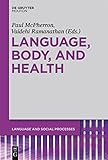Language, Body, and Health / ed. by Paul McPherron, Vaidehi Ramanathan.
Material type: TextSeries: Language and Social Processes [LSP] ; 2Publisher: Berlin ; Boston : De Gruyter Mouton, [2011]Copyright date: ©2012Description: 1 online resource (280 p.)Content type:
TextSeries: Language and Social Processes [LSP] ; 2Publisher: Berlin ; Boston : De Gruyter Mouton, [2011]Copyright date: ©2012Description: 1 online resource (280 p.)Content type: - 9781934078198
- 9781934078204
- 306.461 22/ger
- online - DeGruyter
- Issued also in print.
| Item type | Current library | Call number | URL | Status | Notes | Barcode | |
|---|---|---|---|---|---|---|---|
 eBook
eBook
|
Biblioteca "Angelicum" Pont. Univ. S.Tommaso d'Aquino Nuvola online | online - DeGruyter (Browse shelf(Opens below)) | Online access | Not for loan (Accesso limitato) | Accesso per gli utenti autorizzati / Access for authorized users | (dgr)9781934078204 |
Frontmatter -- Acknowledgements -- List of contributors -- Contents -- Chapter 1. Language, body, and health: An introduction -- Part I. Bodies and communication -- Chapter 2. Community, controversy, and compromise: The language of visual impairment -- Chapter 3. Rebuilding the body: Biomedical and societal discourses and the decision to perform a living-donor organ transplant surgery -- Chapter 4. Reading “intentions”: Communication challenges for parents of children with autism and partial hearing -- Part 2. Bodies and cognitive “impairments” -- Chapter 5. Intentional stance and Lucinda Greystone: Embodied memory in conversational reminiscence by a speaker with Alzheimer’s Disease -- Chapter 6. Body in autism: A view from social interaction -- Part 3. Bodies and chronic ailments -- Chapter 7. Negotiating the invisible: Two women making sense of chronic illness through narrative -- Chapter 8 “Training your taste buds”: The language of success in diabetes “self-efficacy” -- Part 4. Bodies and body performances -- Chapter 9. The discursive construction of the female body in family planning pamphlets -- Chapter 10. Blood talk: A discursive perspective on transcultural identity and mental health -- Chapter 11. Body act: Contemporary Chinese body performance, critical narrative, and somatic writing -- Chapter 12. Bodies and applied linguistics: The challenge of theory -- Index
restricted access online access with authorization star
http://purl.org/coar/access_right/c_16ec
This edited book addresses ways in which 'bodies' conceived broadly – get languaged, and ways in which ideas of 'normalcy' and 'normal' bodies are held in place and reproduced. The articles show how it is through this medium that people with ailments or 'unusual' bodies get positioned and slotted in certain ways. The present volume represents a departure from other works in at least two ways. First, it brings in discourses around bodies per se into language-related research, a realm that previous research has not directly engaged. Second, it ushers in discussions about bodies by critically addressing the language by which experiences around bodily breakdowns and ailments occur. Calling attention to a host of discourses – biomedical, societal, poststructuralist – and drawing on a variety of disciplinary perspectives, critical theories, ethnographically gathered materials, and extant data, the chapters pierce the general veil of silence that we have collectively drawn regarding how some of our most intimate body (dis)functions impact our everyday living and sense of "normalcy".
Issued also in print.
Mode of access: Internet via World Wide Web.
In English.
Description based on online resource; title from PDF title page (publisher's Web site, viewed 28. Feb 2023)


